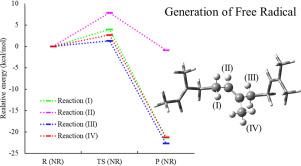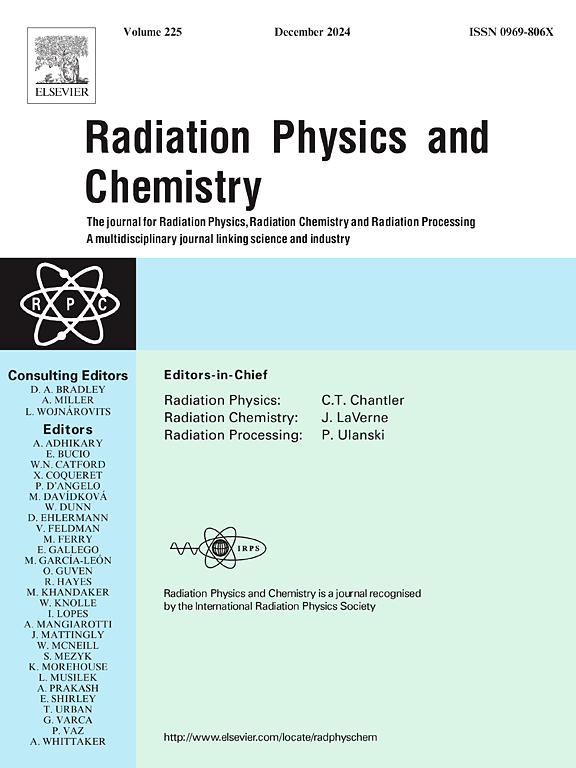使用电子束辐照和 DFT 驱动交联剂有效硫化天然橡胶
IF 2.8
3区 物理与天体物理
Q3 CHEMISTRY, PHYSICAL
引用次数: 0
摘要
本研究探索了一种利用电子束辐照硫化天然胶乳的环保高效方法,并通过交联剂进行了强化。与传统的硫磺硫化不同,电子束硫化可在室温下进行,从而减少了对化学添加剂的需求,并消除了有毒废物。利用乙二醇二甲基丙烯酸酯(EDMA)和 1,6-己二醇二丙烯酸酯(HDDA)作为交联剂,对硫化效率进行了实验和理论研究。电子束辐照是通过均聚裂解天然橡胶中的共价键产生活性自由基的有效方法。量子力学计算,包括密度泛函理论(DFT)和使用线性和二次同步转运方法的过渡态搜索,被用来研究硫化过程中的分子结构、能量和反应途径。研究结果表明,与乙二胺四乙酸二甲酯(EDMA)相比,乙二胺四乙酸二甲酯(HDDA)具有更优越的交联性能,是提高硫化效率的首选。这些结果为优化橡胶生产工艺提供了宝贵的见解,有可能提高工业橡胶生产的质量和效率。本文章由计算机程序翻译,如有差异,请以英文原文为准。

Effective natural rubber vulcanization using electron beam irradiation and DFT driven cross-linking agents
This study explores an eco-friendly and efficient method for vulcanizing natural rubber latex using electron beam irradiation, enhanced by cross-linking agents. Unlike conventional sulfur vulcanization, electron beam vulcanization can occur at room temperature, reducing the need for chemical additives and eliminating toxic waste. Both experimental and theoretical studies were performed to evaluate vulcanization efficiency, utilizing ethylene glycol dimethacrylate (EDMA) and 1,6-hexanediol diacrylate (HDDA) as cross-linking agents. Electron beam irradiation is an effective method for generating reactive radical species via homolytic cleavage of covalent bonds in natural rubber. Quantum mechanical calculations, including density functional theory (DFT) and transition state searches using linear and quadratic synchronous transit methods, were employed to examine molecular structures, energies, and reaction pathways in the vulcanization process. The findings reveal that HDDA demonstrates superior cross-linking performance compared to EDMA, making it the preferred choice for enhancing vulcanization efficiency. These results offer valuable insights for optimizing rubber manufacturing processes, potentially improving the quality and efficiency of industrial rubber production.
求助全文
通过发布文献求助,成功后即可免费获取论文全文。
去求助
来源期刊

Radiation Physics and Chemistry
化学-核科学技术
CiteScore
5.60
自引率
17.20%
发文量
574
审稿时长
12 weeks
期刊介绍:
Radiation Physics and Chemistry is a multidisciplinary journal that provides a medium for publication of substantial and original papers, reviews, and short communications which focus on research and developments involving ionizing radiation in radiation physics, radiation chemistry and radiation processing.
The journal aims to publish papers with significance to an international audience, containing substantial novelty and scientific impact. The Editors reserve the rights to reject, with or without external review, papers that do not meet these criteria. This could include papers that are very similar to previous publications, only with changed target substrates, employed materials, analyzed sites and experimental methods, report results without presenting new insights and/or hypothesis testing, or do not focus on the radiation effects.
 求助内容:
求助内容: 应助结果提醒方式:
应助结果提醒方式:


